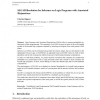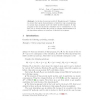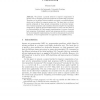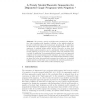131
click to vote
FUIN
2010
15 years 17 days ago
2010
Abstract. Logic Programs with Annotated Disjunctions (LPADs) allow to express probabilistic information in logic programming. The semantics of an LPAD is given in terms of the well...
126
click to vote
IWFM
2000
15 years 3 months ago
2000
Several recent publications have exhibited relationships between the theories of logic programming and of neural networks. We consider a general approach to representing normal lo...
112
click to vote
AAAI
2004
15 years 3 months ago
2004
An odd cycle of a logic program is a simple cycle that has an odd number of negative edges in the dependency graph of the program. Similarly, an even cycle is one that has an even...
118
click to vote
ASIAN
1999
Springer
15 years 6 months ago
1999
Springer
Unfold/fold transformation systems for logic programs have been extensively investigated. Existing unfold/fold transformation systems for normal logic programs allow only Tamaki-Sa...
137
click to vote
ILP
2001
Springer
15 years 6 months ago
2001
Springer
In the line of previous work by S. Muggleton and C. Sakama, we extend the logical characterization of inductive logic programming, to normal logic programs under the stable models ...
153
click to vote
ASP
2003
Springer
15 years 7 months ago
2003
Springer
We present a general method to improve computation of answer sets by analyzing structural properties of normal logic programs. Therefore we use labeled directed graphs associated t...
122
click to vote
NMR
2004
Springer
15 years 7 months ago
2004
Springer
All major semantics of normal logic programs and normal logic programs with aggregates can be described as fixpoints of the one-step provability operator or of operators that can...
122
click to vote
LOPSTR
2005
Springer
15 years 7 months ago
2005
Springer
A variable is local if it occurs in a clause body but not in its head. Local variables appear naturally in practical logic programming, but they complicate several aspects such as ...
108
click to vote
LPNMR
2007
Springer
15 years 8 months ago
2007
Springer
Abstract. We present a purely model-theoretic semantics for disjunctive logic programs with negation, building on the infinite-valued approach recently introduced for normal logic...




